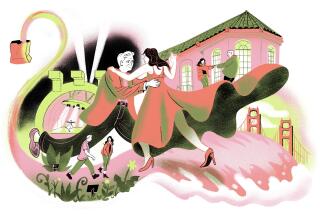When It Jolts You Like a Stun Gun, It Could Be Love at First Sight
- Share via
Fifty-four years ago, when he was 27 and just out of the Army after a bout of malaria, Howard Engelman went on the blind date that changed his life.
Engelman’s date was Betty Maslon, the 20-year-old cousin of a friend. The moment he saw her, he fell instantly, madly, deeply in love. She was mesmerizing and magnificent.
“She was just beautiful,” Bel-Air resident Engelman, 83, recalled recently. “We rode around (in his blue convertible), had a bite to eat and the next thing I knew, it was 2 a.m. We didn’t dance, we didn’t go to the theater. We looked into each others’ eyes and talked. The next morning, we had another date and at the end of that day we were engaged. . . . Life has been glorious. It was just kismet.”
No one knows much about the phenomenon of love at first sight, but human beings have experienced the crashing, spiraling urgency of love-at-a-glance for centuries. “Love is a certain inborn suffering derived from the sight of and excessive meditation upon the beauty of the opposite sex,” a 12th century French cleric wrote, “which causes each one to wish above all things the embraces of the other.”
Falling in love all at once is dependent upon certain factors occurring simultaneously--including timing, barriers, mystery, similarities, matched unconscious blueprints about love and even the right smells, according to Helen Fisher, an anthropologist at Rutgers University and author of “Anatomy of Love” (Columbine, 1992). It can happen gradually over a weekend, or in a moment. A rush of giddiness, euphoria and energy comes when the potential sweetheart signals interest: a turning of the head, an open smile, a long gaze or ready laughter at one’s joke.
When Roland Colton, a trial lawyer, first saw podiatrist Najid Birjandi three years ago, love struck like a stun gun. “I remember seeing her and thinking, ‘My goodness, this is the most beautiful woman I have ever seen in my whole life,’ ” said Colton, 49, whose law firm was presenting a risk management seminar to a group of physicians in Los Angeles. “She had an incredible smile and an incredible laugh. There was an intelligence in her eyes. When I first saw her, I wondered what it would be like to be married to her. I didn’t even think about doing anything about it because I was so in awe. I was supposed to be monitoring my employees and I couldn’t even do that.”
Two weeks later, Colton mustered the courage to call her for a date. Birjandi had noticed him, too. Within a couple of months, they talked about marriage. “I didn’t believe in love at first sight before,” he said. “It was a feeling, an electric feeling. It is hard to describe really.”
Love at first sight is infatuated love. It’s based on passion alone in the absence of intimacy or commitment, said Robert Sternberg, a Yale University psychology professor and author of “Cupid’s Arrow” (Cambridge University Press, 1998). Some factors help it along: meeting someone while in a state of physical arousal (from exercise, such as running or skiing, or anxiety, such as getting stuck on an elevator) can increase the chance of instant love; also, meeting someone who has traits that elicit an immediate attraction (i.e. a certain smell, eye color, shape of face or gait).
Love at first sight is nature’s work, hypothesizes Fisher. Men are more susceptible to love at first glance, research indicates, because they are more responsive to visual cues. “Romantic attraction evolved to get you out there and select between partners and focus your energy on one at a time,” said Fisher. “For millions of years, men had to choose women who showed signs of health and beauty--signs that they could bear healthy babies. So men are very sensitive to visual cues. Women are more attracted to men with signs of status and resources and to men who will care and provide for them. It takes longer to find that out.”
Although Birjandi had a thriving practice in Long Beach, was happily raising her young daughter as a single mother and had no interest in starting a relationship with a man, she was smitten by the very things Fisher described. “ I remember seeing Roland’s profile and I thought, ‘Wow, what a powerful man,’ ” said Birjandi. “Then when I went out with him, I would feel so calm and secure and relaxed. There was an element of trust.” The pair wed nine months after they met and live in Laguna Niguel with Birjandi’s daughter.
Naturally, there are stories of love at first sight with disastrous outcomes. But, according to New York social psychologist Arthur Aron, people who fall in love intensely have a slightly better chance of a successful relationship. “It increases the likelihood that you feel good about yourself . . . and feel good about the world,” he said.
The swift hand of love worked its magic on Betty Maslon, who married Howard Engelman at the Bel-Air Hotel two weeks after their blind date. A 54-year marriage, five children and 16 grandchildren are all testament to successful love.
“The first time I saw him,” said Betty, 75, “he was just beautiful. He was just an adorable man. It was euphoria. Everything was roses. It was very ethereal. I wasn’t about to let this one go.”
*
Birds & Bees is a weekly column on relationships and sexuality. Kathleen Kelleher can be reached via e-mail at [email protected].


